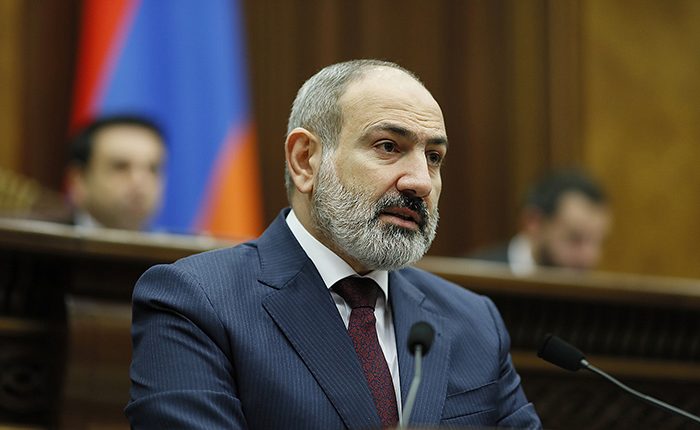YEREVAN — Prime Minister Nikol Pashinyan confirmed on Wednesday that Armenia is facing international pressure to scale back its demands on Nagorno-Karabakh’s status.
“Today the international community is clearly telling us that being the only country in the world that does not bilaterally recognize the territorial integrity to Turkey’s ally Azerbaijan is very dangerous for not only Artsakh (Karabakh) but also Armenia,” Pashinyan told the Armenian parliament.
“Today the international community is again telling us, ‘Lower a bit your bar on the question of Nagorno-Karabakh’s status and we will ensure a great international consolidation around Armenia and Artsakh.’ Or else, says the international community, please do not pin your hopes on us. Not because we don’t want to help you but because we can’t help you,” he said in an hour-long speech.
Pashinyan said he is therefore keen to sign a peace treaty with Azerbaijan “as soon as possible.” He reiterated that Baku’s proposals regarding such an accord, including a mutual recognition of each other’s territorial integrity, are acceptable to Yerevan. He again stated that a “clarification of the final status of Nagorno-Karabakh” must also be on the agenda of upcoming Armenian-Azerbaijani talks on the treaty.
“Opening an era of peaceful development for our country and region has been adopted as a state strategy,” he announced.
Pashinyan did not explicitly say whether his administration is also ready to formally recognize Azerbaijani sovereignty over Karabakh. He noted only that Yerevan will put the emphasis on “security guarantees for the Armenians of Karabakh and their rights and freedoms.”
Despite his apparent willingness to agree to Baku’s principles for peace negotiations, Pashinyan did not mince words when discussing Azerbaijan’s recent actions in the region.
He slammed Azerbaijani troops for advancing last month on the Karabakh village of Parukh forcing its Armenian residents to flee. Russian peacekeepers quickly reestablished control over the area.
He also blamed the Azerbaijani government for deliberately damaging the sole pipeline carrying gas to Karabakh, depriving residents of heat during an unusual cold spell last month.
“We should not have illusions. What has been and is still one of the biggest problems of the Karabakh issue? That its resolution, this or that formula for resolution, does not depend on us only,” Pashinyan said, alluding to Azerbaijan’s past intransigence in negotiations.
Pashinyan also criticized the work of the Russian peacekeeping contingent stationed in and around Karabakh, as well as the Russia-led military alliance of which Armenia is a member.
“We find it important for the Russian peacekeeping contingent to take measures to withdraw the Azerbaijani military units from its area of responsibility,” he said. “This is an absolute necessity and a very serious trial for the Russian peacekeeping mission in Nagorno-Karabakh.”
He slammed the Russian troops for apparently blocking the entry of a number of Armenian lawmakers to Karabakh on Tuesday, calling the move “perplexing” and noting that it “contradicts the terms” of the November 2020 ceasefire agreement that resulted in Russia’s deployment of peacekeepers to the region.
Pashinyan also had harsh words for the Collective Security Treaty Organization, a military alliance that includes Russia, Armenia, and four other ex-Soviet states.
Last May, the CSTO largely ignored Pashinyan’s calls for help following the incursion of Azerbaijani troops into the easternmost portions of Armenia’s Gegharkunik and Syunik regions, saying that the incident did not fall under the alliance’s charter on collective defense. Azerbaijani forces remain in control of about 45 square kilometers of Armenian territory to this day.
“How the CSTO reacted to what had happened, I think, was also a failure for the organization,” he said. “The fact is that the CSTO has not addressed this situation in any way, even as an observer.”
The CSTO’s failure to respond to Azerbaijan’s incursion has “justified the long-held fears among the Armenian public that the organization, which is of key importance to Armenia’s security system, will do nothing at the necessary moment,” Pashinyan added.
At the same time, Pashinyan noted that he continues to support the idea of working with the Minsk Group to pursue peace in the region, saying that “we have not given up on this idea.”
Pashinyan did not specify whether the pressure on the Armenian side emanates only from the West or Russia as well.
Pashinyan is scheduled to meet with Russian President Vladimir Putin on April 19 during an official visit to Moscow.










